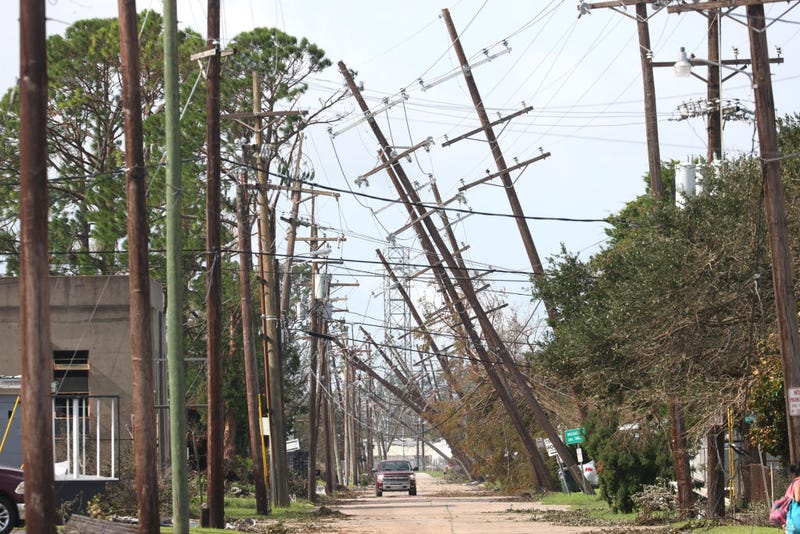
FEMA is reimbursing Louisiana residents affected by Hurricane Ida for a wide range of expenses, and residents may qualify for aid due to the large expanse of power outages across the region, not just from strict storm-related home damage.
For most benefits, apply at disasterassistance.gov or 1-800-621-3362. If you have homeowner's or renter's insurance, you should file with your insurance company as well.
Here's an overview of what FEMA covers if you qualify. Eligibility is determined on a case-by-case basis, officials said.
Critical, life-saving needs
FEMA is offering $500 in rapid financial assistance to Hurricane Ida survivors for critical, life-saving needs, such as:
Food
Water
Fuel for transportation
Prescription drugs
If you qualify, you can get a onetime, $500 check per household.
Hotel rooms
FEMA is paying for rooms at specific hotels for qualified applicants for up to 30 days.
Apply for assistance at disasterassistance.gov or by calling 1-800-621-3362 and FEMA will notify you if you qualify for transitional sheltering assistance.
Participating hotels are in Louisiana, Alabama, Arkansas, Georgia, Florida, Mississippi, New Mexico, Oklahoma, Tennessee and Texas.
Hotels costs are not retroactive before Sept. 2 but hurricane survivors can submit their receipts to FEMA for possible reimbursement of out-of-pocket expenses.
Reimbursements for generators and chainsaws
FEMA is offering reimbursements up to $800 for generators and $250 for chainsaws.
You have to meet specific requirements, including buying the equipment between Aug. 26 and Sept. 25. The program is available for homeowners and renters.
Blue tarps for damaged roofs
Free, temporary roofs are available in several parishes in southeast Louisiana that were damaged by Hurricane Ida. Residents can sign up at Blueroof.us or 1-888-ROOF-Blu.
The tarps are fiber-reinforced sheeting to cover damaged roofs until permanent repairs are made.
The program is aimed at primary residences or permanently-occupied rental property with less than 50% structural damage. Vacation homes are not eligible.
The work is managed by the U.S. Army Corps of Engineers for FEMA.
Temporary rental assistance
FEMA is providing temporary rental assistance for people who need to relocate. The program is available to homeowners and renters.
The program provides one month of expedited rental assistance to eligible applicants who reported their essential utilities are temporarily unavailable and whose primary home is in the one of the qualifying parishes.
Assistance for renters
FEMA is offering grants to help renters on a case-by-case basis. The grants do not have to be repaid and they are not taxable income, so they won’t affect eligibility for Social Security, Medicare, Medicaid or Supplemental Nutrition Assistance Program benefits.
Financial awards may be available to rent or pay for a different place to live for a limited time while repairs are made to your rental home or until it is livable. Rental grants may be used for security deposits, rent and the cost of essential utilities, such as gas and water. The grants may not be used to pay for separate cable or internet bills.
Help is also available for renters with uninsured and underinsured necessary expenses and serious needs caused by Hurricane Ida.
Renters may qualify for assistance for with replacement or repair of necessary personal property, such as furniture, appliances, clothing, textbooks or school supplies; replacement or repair of tools and other job-related equipment; vehicle repair; and medical/dental bills.
Childcare, funeral and other expenses
Financial assistance is available for necessary expenses and serious needs directly caused by the disaster, including:
Child-care expenses
Medical and dental expenses
Funeral and burial expenses
Damages to essential household items (room furnishings, appliances); clothing; tools (specialized or protective clothing and equipment) required for your job; necessary educational materials (computers, schoolbooks, supplies)
Fuel for the primary heat source (heating oil, gas)
Clean-up items (wet/dry vacuum, dehumidifier)
Damage to an essential vehicleMoving and storage expenses caused by the disaster.
Moving and storage of essential household goods to prevent further damage, such as ongoing repairs, and returning property to the applicant’s primary residence.
Loans available
The Small Business Administration is offering low-interest disaster loans for qualify applicants, such as businesses, most private nonprofits, homeowners and renters.
Apply at https://disasterloanassistance.sba.gov/, call at (800) 659-2955 or email disastercustomerservice@sba.gov.

